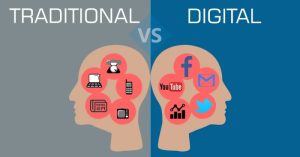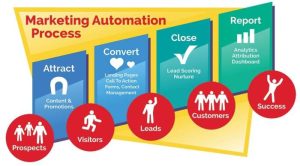
Get ready to dive into the world of e-commerce marketing automation, where efficiency meets innovation and success is just a click away. From personalized strategies to key features, this topic covers it all in an engaging and interactive style that will leave you wanting more.
E-commerce Marketing Automation
Marketing automation in the context of e-commerce refers to the use of software and technology to streamline, automate, and measure marketing tasks and workflows. This allows businesses to effectively target and engage with their customers throughout the buying journey.
Benefits of E-commerce Marketing Automation
- Increased efficiency: Automation reduces manual tasks, saving time and resources.
- Personalized customer experience: Tailoring messages based on customer behavior leads to higher engagement and conversions.
- Improved lead nurturing: Automated workflows help nurture leads and guide them towards making a purchase.
- Enhanced analytics: Tracking and analyzing customer data enables businesses to make data-driven decisions.
Key Features of E-commerce Marketing Automation Tools
- Segmentation: Divide customers into groups based on behavior, preferences, or demographics.
- Workflow automation: Set up automated triggers and actions for specific customer interactions.
- Email marketing: Send personalized and targeted emails to customers at the right time.
- Lead scoring: Assign scores to leads based on their interactions and prioritize high-quality leads.
- Analytics and reporting: Track campaign performance and measure ROI to optimize marketing strategies.
Importance of Personalized Marketing Strategies in E-commerce Automation
Personalized marketing strategies play a crucial role in e-commerce automation as they allow businesses to deliver relevant content to individual customers. By understanding customer preferences, behavior, and purchase history, businesses can create tailored messages that resonate with each customer. This leads to higher engagement, increased customer loyalty, and ultimately, improved sales and revenue.
Marketing E-commerce Advertising

When it comes to advertising, the strategies used in traditional marketing differ significantly from those employed in e-commerce advertising. In the digital realm, online retailers have a unique set of tools and platforms at their disposal to reach their target audience effectively.
Successful E-commerce Advertising Strategies
- Utilizing targeted ads on social media platforms to reach specific demographics and interests.
- Implementing retargeting campaigns to remind potential customers about products they viewed but did not purchase.
- Using influencer marketing to leverage the reach and credibility of popular online personalities.
- Creating compelling video content to showcase products in action and engage viewers.
Role of Social Media Advertising in E-commerce Marketing
Social media advertising plays a crucial role in e-commerce marketing by allowing businesses to target their ads to a highly specific audience based on demographics, interests, and online behavior. Platforms like Facebook, Instagram, and Pinterest offer robust advertising tools that can help online retailers increase brand visibility and drive sales.
Tips for Optimizing Advertising Campaigns for E-commerce Businesses
- Regularly analyze and optimize ad performance by tracking key metrics like click-through rates and conversion rates.
- Test different ad creatives, copy, and targeting options to identify what resonates best with your audience.
- Utilize A/B testing to compare the performance of different ad variations and make data-driven decisions.
- Consider investing in remarketing campaigns to target users who have already shown interest in your products.
Affiliate Marketing in E-commerce
Affiliate marketing is a performance-based marketing strategy where businesses reward affiliates for driving traffic or sales to their website through the affiliate’s marketing efforts. In the e-commerce industry, affiliate marketing plays a crucial role in expanding reach, increasing sales, and building brand awareness.E-commerce businesses can leverage affiliate marketing by partnering with influencers, bloggers, or other websites that have a relevant audience.
By offering these affiliates a commission for every sale or lead they generate, businesses can tap into new customer bases and benefit from the affiliate’s credibility and reach.
Key Metrics for Successful Affiliate Marketing Campaigns
- Affiliate conversion rate: Measure the percentage of affiliate-generated clicks that result in a sale.
- Average order value (AOV): Track the average amount spent by customers referred by affiliates.
- Return on investment (ROI): Calculate the ratio of revenue generated to the cost of the affiliate program.
- Affiliate retention rate: Monitor the percentage of affiliates that continue to promote your products over time.
Examples of Successful Affiliate Marketing Programs in E-commerce
- Amazon Associates: Amazon’s affiliate program allows website owners and bloggers to earn commissions by promoting Amazon products.
- Rakuten Marketing: Rakuten offers a comprehensive affiliate marketing platform for e-commerce businesses to connect with influencers and drive sales.
- Shopify Affiliate Program: Shopify’s affiliate program incentivizes partners to refer new customers to the e-commerce platform.
Branding in E-commerce
Branding plays a crucial role in the success of e-commerce businesses. It helps to create a distinct identity, build trust with customers, and differentiate from competitors in the online retail space. A strong brand can influence customer perception, drive loyalty, and ultimately lead to higher sales and growth.
Importance of Branding for E-commerce Businesses
Branding is essential for e-commerce businesses as it helps to establish credibility, create a memorable experience for customers, and foster trust. A well-defined brand identity can set the tone for all marketing efforts, from website design to social media presence, and help to create a consistent and cohesive brand image.
- Builds Trust: A strong brand instills confidence in customers and reassures them of the quality and reliability of products or services.
- Increases Recognition: Branding helps businesses stand out in a crowded marketplace and become easily recognizable to consumers.
- Drives Customer Loyalty: When customers identify with a brand and its values, they are more likely to become repeat buyers and brand advocates.
Examples of Successful E-commerce Brands and Their Branding Strategies
Some successful e-commerce brands that have excelled in branding include:
- Amazon: Known for its customer-centric approach and seamless shopping experience, Amazon has built a strong brand synonymous with convenience and reliability.
- Warby Parker: By offering affordable, stylish eyewear and a socially conscious mission, Warby Parker has created a brand that resonates with millennial consumers.
- Sephora: Through personalized recommendations, exclusive product offerings, and a focus on beauty education, Sephora has established itself as a trusted beauty destination.
Tips for Building a Strong Brand Identity in the Competitive E-commerce Market
To build a strong brand identity in the competitive e-commerce market, consider the following tips:
- Define Your Brand Values: Identify what your brand stands for and communicate these values consistently across all touchpoints.
- Create a Memorable Brand Story: Develop a compelling narrative that resonates with your target audience and sets your brand apart from competitors.
- Focus on Visual Identity: Invest in high-quality branding elements such as logos, color schemes, and imagery to create a cohesive and visually appealing brand presence.
- Deliver Consistent Branding: Ensure that your brand messaging, tone, and visuals are consistent across all channels to reinforce brand recognition and trust.
Direct Marketing Strategies for E-commerce
Direct marketing in the context of e-commerce refers to the practice of businesses reaching out directly to consumers through various channels to promote products or services, generate sales, and build relationships.
Different Direct Marketing Tactics
- Email Marketing: Sending personalized promotional emails to customers based on their preferences and behavior.
- SMS Marketing: Engaging with customers through text messages to drive sales and offer exclusive deals.
- Social Media Advertising: Using targeted ads on platforms like Facebook and Instagram to reach specific audiences.
- Influencer Marketing: Collaborating with influencers to promote products to their followers and increase brand visibility.
Successful Direct Marketing Campaigns in E-commerce
- Amazon Prime Day: Amazon’s annual sales event offering exclusive deals to Prime members, driving a surge in sales.
- Sephora Beauty Insider Program: Sephora’s loyalty program offering personalized rewards and discounts to members, increasing customer engagement and retention.
- Kylie Cosmetics Lip Kits: Kylie Jenner’s direct-to-consumer approach through social media marketing created hype and drove sales for her cosmetics brand.
Tips for Integrating Direct Marketing
- Segment Your Audience: Divide your customers into groups based on demographics, behavior, or preferences to send targeted messages.
- Personalize Content: Use customer data to create personalized messages, offers, and recommendations that resonate with individual customers.
- Test and Optimize: Continuously test different approaches, messages, and channels to optimize your direct marketing campaigns for better results.
Internet Marketing Techniques for E-commerce
In the world of e-commerce, leveraging internet marketing techniques is crucial for success. From to SEM, each strategy plays a vital role in reaching your target audience and driving sales.
(Search Engine Optimization)
is essential for ensuring your e-commerce website ranks high in search engine results. By optimizing your website’s content and structure, you can attract organic traffic and improve visibility online.
- Focus on relevant s related to your products or services.
- Create high-quality, unique content that provides value to your audience.
- Optimize your website’s meta tags, titles, and descriptions for search engines.
SEM (Search Engine Marketing)
SEM involves paid advertising to increase your website’s visibility in search engine results pages. This includes strategies like Google Ads and Bing Ads to drive targeted traffic to your e-commerce site.
- Set specific goals for your SEM campaigns, such as increasing sales or brand awareness.
- Use targeting to reach users actively searching for products like yours.
- Regularly monitor and analyze the performance of your SEM campaigns to optimize results.
Content Marketing
Content marketing is about creating and distributing valuable, relevant content to attract and engage your target audience. By providing informative and entertaining content, you can build trust with customers and drive conversions.
- Develop a content strategy that aligns with your e-commerce goals and target audience.
- Utilize various content formats like blog posts, videos, and infographics to engage users.
- Promote your content through social media and email marketing to reach a wider audience.
Successful Internet Marketing Strategies in E-commerce
Many e-commerce brands have successfully implemented internet marketing strategies to grow their businesses. For example, Amazon’s personalized recommendation system and social media campaigns have helped them reach a global audience and increase sales. Similarly, Shopify’s optimization tools and email marketing campaigns have enabled them to support thousands of online stores and drive revenue.
Mailing Lists in E-commerce Marketing

Email marketing is a crucial component of e-commerce marketing strategies, and mailing lists play a significant role in reaching out to potential and existing customers effectively.
Significance of Mailing Lists in E-commerce Marketing
Building and maintaining a quality email list is essential for e-commerce businesses as it allows them to directly communicate with their target audience. By sending personalized and targeted emails, businesses can nurture leads, promote products, and drive sales effectively.
Benefits of Email Marketing for E-commerce Businesses
- Increased Engagement: Email marketing helps in engaging customers through personalized content and promotions.
- Cost-Effective: Compared to traditional marketing channels, email marketing is a cost-effective way to reach a large audience.
- Drive Sales: By sending targeted emails with product recommendations and offers, businesses can drive sales and increase revenue.
- Build Brand Loyalty: Regular communication through email helps in building brand loyalty and trust among customers.
Tips for Building and Growing a Quality Email List for E-commerce
- Offer Incentives: Provide exclusive discounts or offers in exchange for email sign-ups.
- Create Engaging Content: Develop compelling content that encourages visitors to subscribe to your mailing list.
- Optimize Sign-Up Forms: Make it easy for users to subscribe by optimizing sign-up forms on your website.
- Segment Your List: Segment your email list based on customer preferences and behaviors for targeted campaigns.
Examples of Successful Email Marketing Campaigns in the E-commerce Industry
Amazon: Utilizes personalized product recommendations based on user behavior to drive sales and engagement.
Sephora: Sends targeted emails with beauty tips, product recommendations, and exclusive offers to enhance customer loyalty.
ASOS: Implements dynamic content in emails to showcase products based on user browsing history, improving click-through rates.
Outcome Summary
In conclusion, e-commerce marketing automation is the secret weapon for online businesses looking to thrive in a competitive market. With personalized strategies and efficient tools, success is within reach for those who embrace this innovative approach.
Commonly Asked Questions
What is the significance of marketing automation in e-commerce?
Marketing automation in e-commerce streamlines processes, increases efficiency, and helps businesses reach their target audience effectively.
How can e-commerce businesses benefit from personalized marketing strategies?
Personalized marketing strategies in e-commerce lead to higher engagement, increased conversions, and stronger customer loyalty.
What are the key features of e-commerce marketing automation tools?
E-commerce marketing automation tools often include email marketing automation, customer segmentation, lead scoring, and analytics for tracking campaign performance.
Why is branding important for e-commerce businesses?
Branding in e-commerce helps businesses stand out, build trust with customers, and create a unique identity in a crowded market.
How can e-commerce businesses integrate direct marketing into their overall strategies?
E-commerce businesses can integrate direct marketing by using tactics like email marketing, SMS marketing, personalized offers, and targeted advertising to reach customers directly.





